Rockford Industrial Workbench Solutions: Application Analysis of Heavy-Duty Benches, Anti-Static Workstations, and Stainless Steel Maintenance Tables in Production Line Workshops
The Importance of Industrial Workbenches in Modern Manufacturing
In modern industrial production environments, workbenches serve as fundamental equipment whose performance and quality directly impact production efficiency and product quality. Rockford Factory’s workbench series—including heavy-duty mechanic benches, anti-static workstations, stainless steel maintenance tables with drawers, and production line inspection workstations—provides professional solutions for various industrial scenarios. These workbenches feature excellent design and versatile functionality, meeting diverse needs from heavy machinery processing to precision electronic assembly.
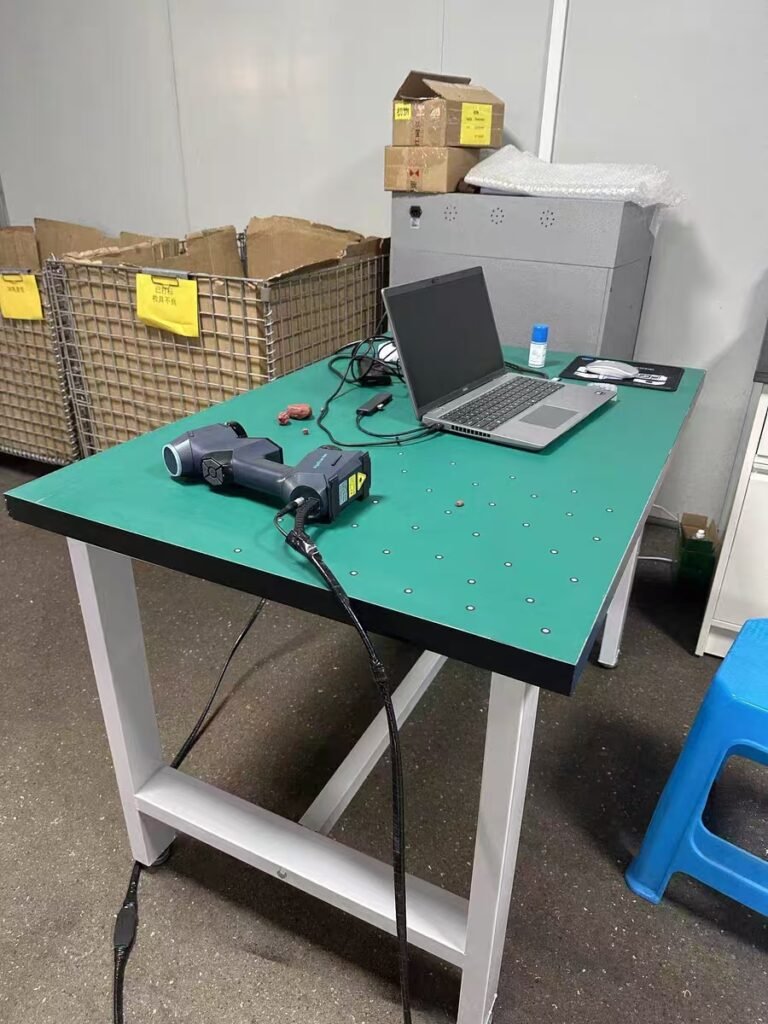
Heavy-Duty Mechanic Bench: Robust and Durable Industrial Foundation Equipment
Heavy-duty mechanic benches are indispensable foundation equipment in machining and assembly workshops. Rockford Factory’s heavy-duty mechanic benches are manufactured from high-strength steel and feature the following characteristics:
Structural Design Features
Heavy-duty mechanic benches typically use 2-3mm thick high-quality steel plates as tabletops, reinforced with rib structures to ensure the surface remains deformation-free under heavy loads. The legs are welded from square or rectangular tubes, with adjustable feet at the bottom to adapt to different ground conditions. The overall structure is optimized through finite element analysis to ensure stability under various working loads.
Load Capacity Analysis
Standard heavy-duty mechanic benches typically have load capacities between 500-1000kg, with custom models capable of supporting over 2000kg. This high load capacity enables them to support large mechanical components, molds, and other heavy equipment, meeting the demands of heavy assembly and maintenance operations.
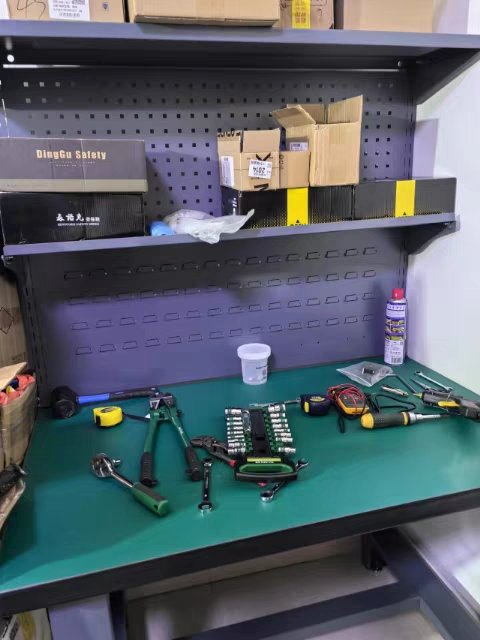
Application Scenarios
Heavy-duty mechanic benches are widely used in mechanical manufacturing, automotive repair, aerospace equipment assembly, and other fields. In these scenarios, workbenches must withstand heavy object impacts, vibrations, and long-term heavy loads, making structural strength and durability crucial.
Anti-Static Workstation: Safety Assurance for Electronic Manufacturing
With the rapid development of electronic manufacturing, anti-static workstations have become essential equipment for protecting sensitive electronic components. Rockford Factory’s anti-static workstations are designed to comply with international electrostatic protection standards.
Anti-Static Principles and Implementation
Anti-static workstations safely dissipate static charges generated during work processes through the conductive properties of tabletop materials and grounding systems. Tabletops typically use anti-static laminates or conductive rubber materials, with surface resistivity between 10^6-10^9Ω, preventing static accumulation while avoiding short circuit risks to electronic components.
Structural Components
A complete anti-static workstation system includes:
- Anti-static tabletop
- Grounding system
- Anti-static tool racks
- Anti-static chairs
- Static detection equipment
These components work synergistically to create a complete electrostatic protection environment, safeguarding electronic components from static damage during production.
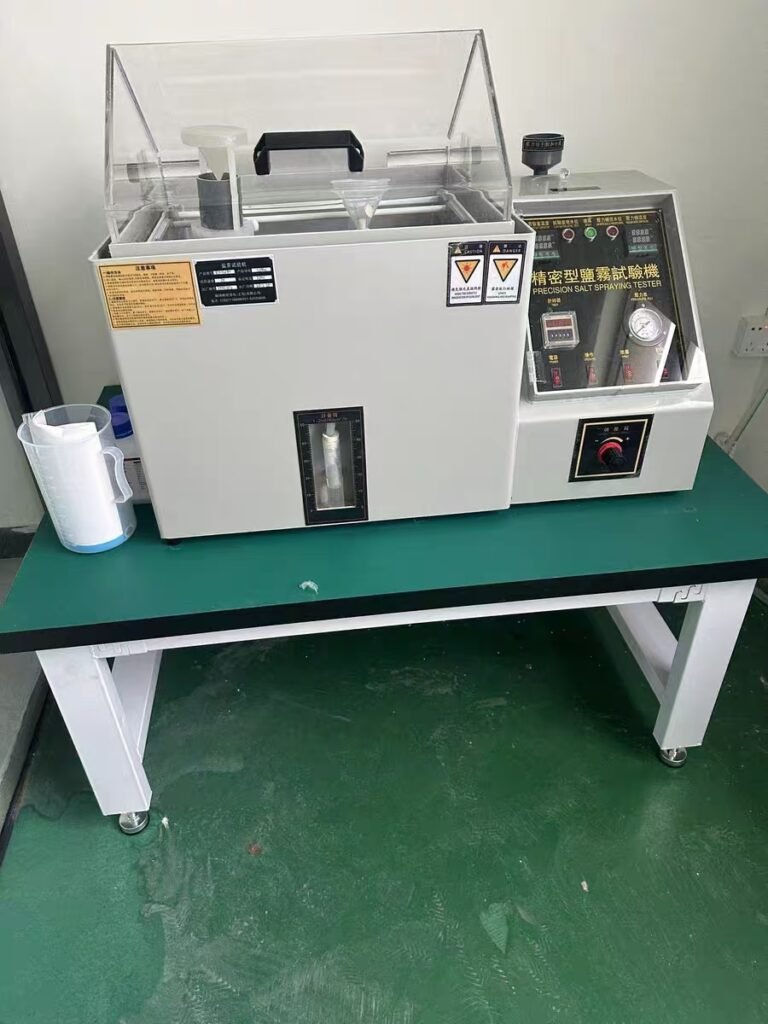
Industry Applications
Anti-static workstations are primarily used in electronic manufacturing, semiconductor production, precision instrument assembly, and other industries. In these fields, even minimal electrostatic discharge can cause electronic component damage, making anti-static measures critical.
Stainless Steel Maintenance Table with Drawers: Perfect Combination of Hygiene and Practicality
In environments with high hygiene requirements such as food processing, pharmaceutical manufacturing, and laboratories, stainless steel maintenance tables with drawers provide ideal solutions.
Material Advantages
Stainless steel materials offer the following advantages:
- Strong corrosion resistance, suitable for various chemical environments
- Smooth surface, easy to clean and disinfect
- Bacteria-resistant, meeting hygiene standards
- High strength and excellent durability
Rockford Factory uses 304 or 316 stainless steel materials, ensuring long-term performance in harsh environments.
Drawer System Design
Drawers feature high-quality slide rail systems with strong load capacity and smooth operation. Drawer interiors can be partitioned as needed to improve organization efficiency for tools and parts. Locking devices ensure secure storage of valuable tools and components.
Application Areas
Stainless steel maintenance tables with drawers are widely used in:
- Equipment maintenance in food processing plants
- Maintenance work in pharmaceutical manufacturing workshops
- Experimental operations in laboratories
- Equipment inspection in chemical enterprises
Production Line Inspection Workstation: Key Link in Quality Control
In modern production lines, inspection workstations are crucial links in quality control. Rockford Factory’s inspection workstations are designed with ergonomics and inspection efficiency in mind.
Ergonomic Design
Inspection workstations typically have adjustable heights between 750-900mm to accommodate operators of different heights. The tabletop angle is adjustable to reduce operator fatigue. Lighting systems use LED sources with adjustable brightness to ensure inspection accuracy.
Inspection Function Integration
Modern inspection workstations typically integrate the following functions:
- Measurement instrument installation interfaces
- Magnifier or microscope brackets
- Inspection data recording systems
- Defective product marking devices
These integrated functions improve inspection efficiency and accuracy.
Role in Quality Control
Inspection workstations play key roles in production line quality control:
- Incoming inspection: Ensuring raw materials meet requirements
- In-process inspection: Monitoring production process quality
- Final inspection: Guaranteeing final product quality
- Rework inspection: Verifying repair effectiveness
Key Factors in Workbench Selection
Selecting appropriate workbenches requires considering the following factors:
Usage Environment Analysis
- Temperature and humidity conditions
- Chemical exposure situations
- Cleanliness requirements
- Space limitations
Functional Requirement Assessment
- Load capacity needs
- Anti-static requirements
- Hygiene standards
- Special functional requirements
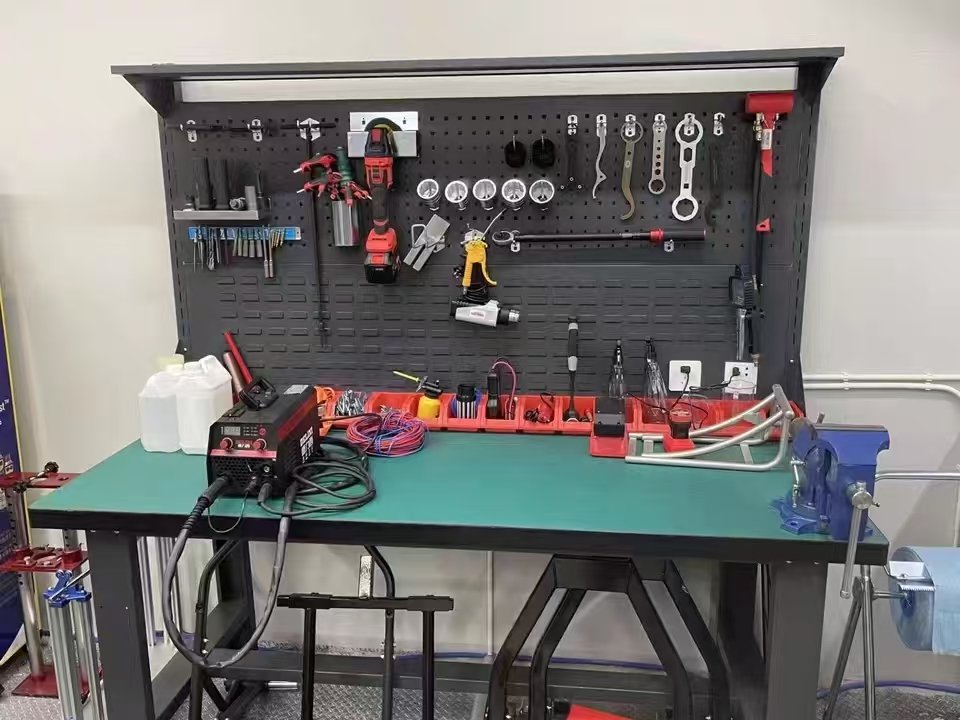
Economic Considerations
- Initial investment cost
- Maintenance costs
- Service life
- Upgrade and expandability
Maintenance and Care Recommendations
Proper maintenance can extend workbench service life:
Daily Maintenance
- Regular tabletop cleaning
- Check fastener tightness
- Lubricate moving parts
- Check anti-static performance
Regular Inspections
- Structural stability checks
- Load capacity testing
- Anti-static performance detection
- Stainless steel surface corrosion inspection
Future Development Trends
Industrial workbench development shows the following trends:
Intelligent Development
- Integrated sensors for usage status monitoring
- Automatic height and angle adjustment
- Data recording and analysis functions
- Remote monitoring and maintenance reminders
Modular Design
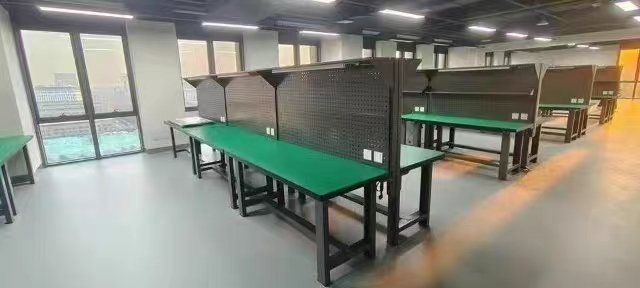
- Detachable and reconfigurable structures
- Plug-and-play functional modules
- Adaptation to different production needs
- Easy upgrade and expansion
Eco-friendly Material Applications
- Use of recyclable materials
- Low-energy production processes
- Long-life design reducing replacements
- Easy disassembly and recycling
Conclusion
Rockford Factory’s heavy-duty mechanic benches, anti-static workstations, stainless steel maintenance tables with drawers, and production line inspection workstations represent professional standards in industrial workbenches. Through careful design and manufacturing, these products meet professional needs across different industrial scenarios. When selecting industrial workbenches, enterprises should comprehensively consider usage environment, functional requirements, and economic factors to choose the most suitable solutions. With Industry 4.0 development, future workbenches will become more intelligent, modular, and eco-friendly, providing better support for manufacturing.
